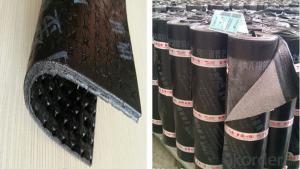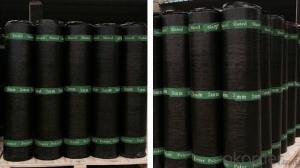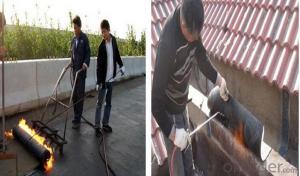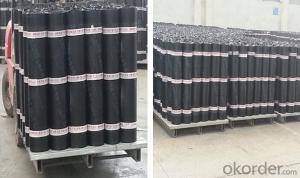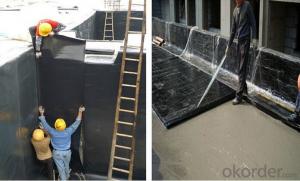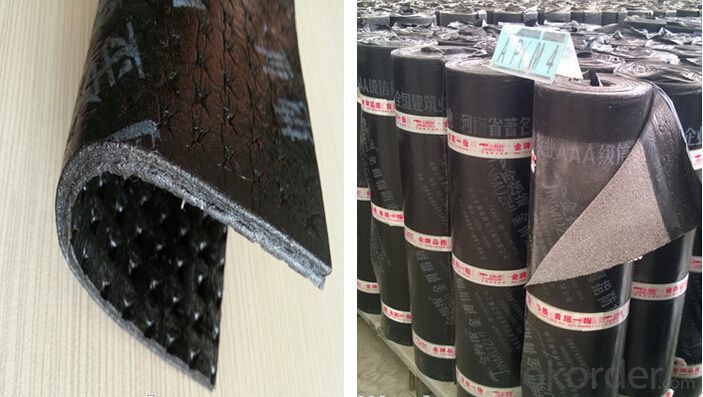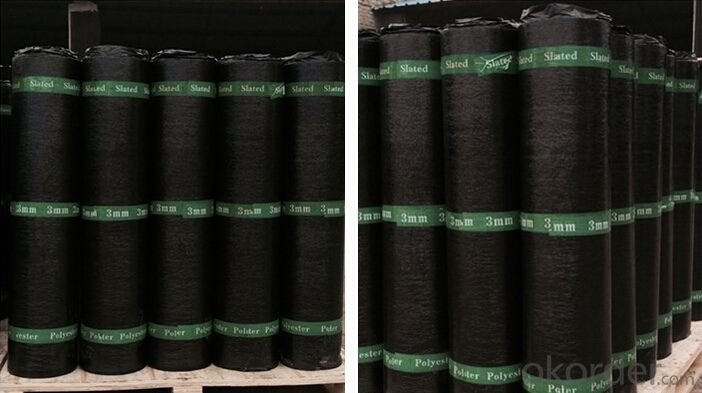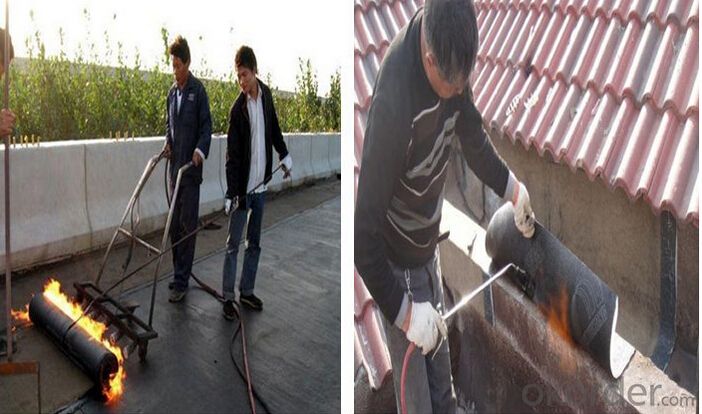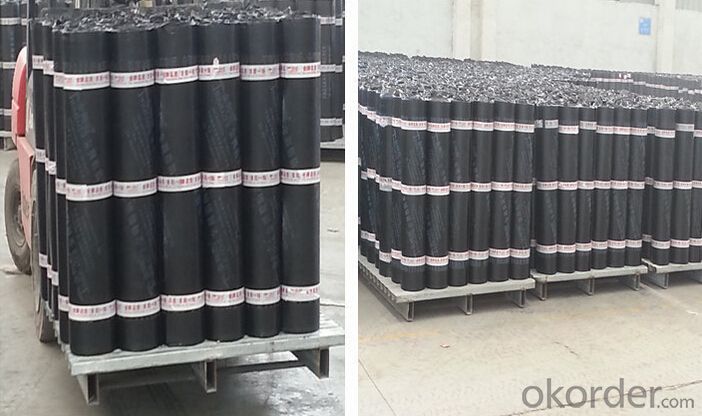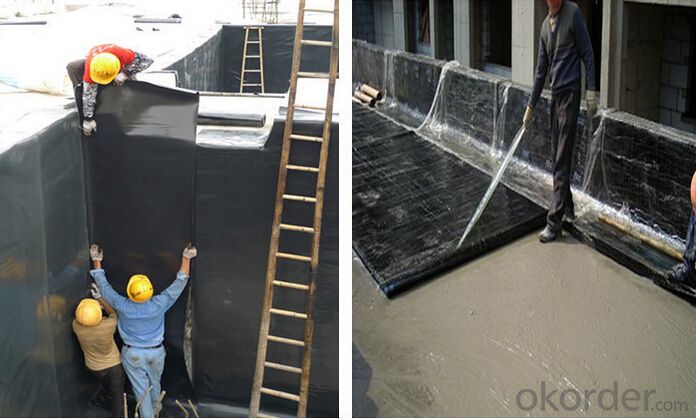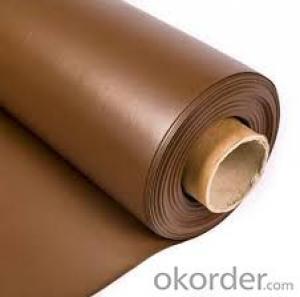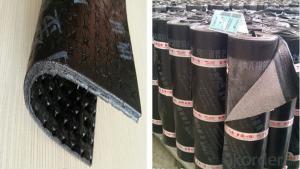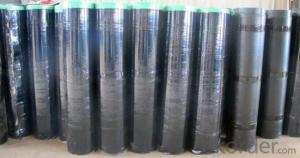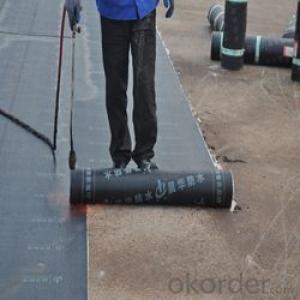SBS Modified Bitumen Waterproof Membrane
- Loading Port:
- Shanghai
- Payment Terms:
- TT OR LC
- Min Order Qty:
- 1000 m²
- Supply Capability:
- 200000 m²/month
OKorder Service Pledge
OKorder Financial Service
You Might Also Like
product description:
sbs waterproof membrane take the “Skin” type waterproof thought, according to the features of construction site, on the basis of width elastomeric modified bitumen waterproofing membrane, combining with features of wet-application self-adhesive membrane, use advanced equipment to produce 2 meters width that WP-SBS wet-application width elastomeric modified bitumen waterproofing membrane (Hereinafter referred to: WP-SBS membrane).WP-SBS is made of bitumen modified with Styrene-Butadiene- Styrene (SBS)as dipping and painting. Its upper surface covers PE membrane and color sand or schist, and lower surface is made of isolation material. Products correspond to the national standards GB18242-2008(elastomeric modified bitumen waterproofing membrane), paste by cement or cement mortar, and construct on the wet base, achieving tight and full adhesion with substrates, eliminating fluid-channeling layer, all above contribute to making a reliable “Skin” type waterproof system, which is a breakthrough innovation in ordinary modified bitumen membrane.
Technical parameter
| Item | Specifications | ||||||||
| Geotextile Unit Weight (g/m²) | 300 | 500 | 600 | 700 | 800 | 900 | 1000 | 1100 | |
| Geomembrane Thickness (mm) | 0.25-0.35 | 0.30-0.50 | |||||||
| Nominal Fracture Strength (KN/m) | 2.50 | 7.50 | 10 | 12 | 14 | 16 | 18 | 20 | |
| Breaking Strength (KN/m,≥,LD/TD) | 2.50 | 7.50 | 10 | 12 | 14 | 16 | 18 | 20 | |
| Standard Intensity Corresponding Elongation Rate (%) | 30~100 | ||||||||
| CBR Burst Strength (KN,≥) | 0.70 | 1.50 | 1.90 | 2.20 | 2.50 | 2.80 | 3.00 | 3.20 | |
| Longitudinal Tear Strength (KN,≥) | 0.05 | 0.25 | 0.32 | 0.40 | 0.48 | 0.56 | 0.62 | 0.70 | |
| Hydrostatic Pressve (Mpa) | See List Below | ||||||||
| Peel Strength (N/cm,≥) | 6 | ||||||||
| Vertical Permeability Coefficient (cm/s) | According to design or contract mentioned. | ||||||||
| Width Variation (%) | -1.00 | ||||||||
| Item | Geomembrane Thickness (mm) | ||||||||
| 0.20 | 0.30 | 0.40 | 0.50 | 0.60 | 0.70 | 0.80 | 1.00 | ||
| Hydrostatic Pressve (Mpa) | One geotextiles with one geomembrane | 0.40 | 0.50 | 0.60 | 0.80 | 1.00 | 1.20 | 1.40 | 1.60 |
| Two geotextiles with one geomembrane | 0.50 | 0.60 | 0.80 | 1.00 | 1.20 | 1.40 | 1.60 | 1.80 | |
Characteristic
1.Good impermeability
2.Possess good tensile strength, elongation and size stability which could be well suited the substrate distortion and crack.
3.Good performance in anti-strength, anti-resistance , anti-erosion, anti-mildew, anti-weathering
4.SBS modified bitumen membrane is specially being applied in the cold area with low temperature, while APP modified bitumen membrane is applied in the area with high temperature.
5.Convenient installation
Applicable scope:
It is widely used for civil building roofing, underground, bridge, parking, pool, tunnel in the line of waterproofing and dampproofing, especially for the building under high temperature.
Application method:
1.Make sure the roof deck smooth ,clean and dry(Moisture<9%),then apply the surface of roof deck homogeneously with a kind bitumen paint till dry to start application.
2.There are two methods in application:
One way is by heating and melting method---Heat the polyethylene film of the membrane and roof deck surface by heating and melting method to be nearly melted (not flowing),then install the membrane fully bonded to the roof deck with overlaps of 5-10cm.
The other way is by cold adhesive method---Pour the cold adhesive homogeneously on the roof deck then roll the membrane to install it to be fully sticked to roof deck.
By heating and melting method and by cold adhesive can be used in alternation in application as requested.
3.After application ,a full serious inspection is required to make sure no air bubble ,no fold,no falling away etc to guarantee the waterproof life.
Our Services
1.If you need some advises for the waterproof construction, we have the best engineer to serve you.
2.We send the free samples to you by freight collect.
3.We will guarantee the quality and the competitive price.
4.We will give you the best packaging and safe shipping.
5.If any problem, we will always be right here waiting for you.
Product usage of pe compound waterproof membrane
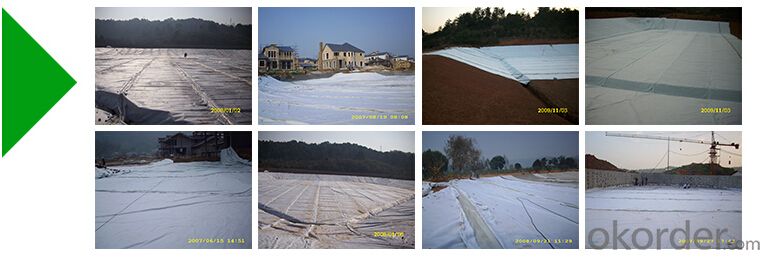
The products are widely used in projects of compound geomembrane impervious
Product line&test
♦Product line
From raw materials to finished products, every process is tested and controlled professionally and seriously by our professional machines and person.

Professional test machines ensure the products qualified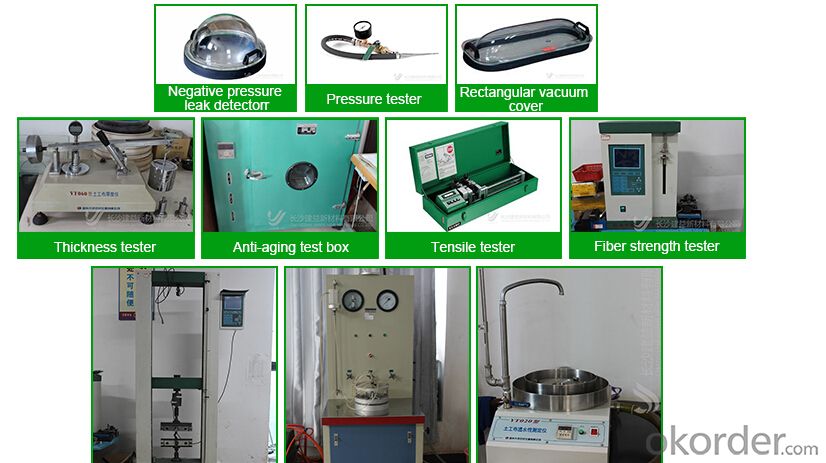 roduct certifications
roduct certifications
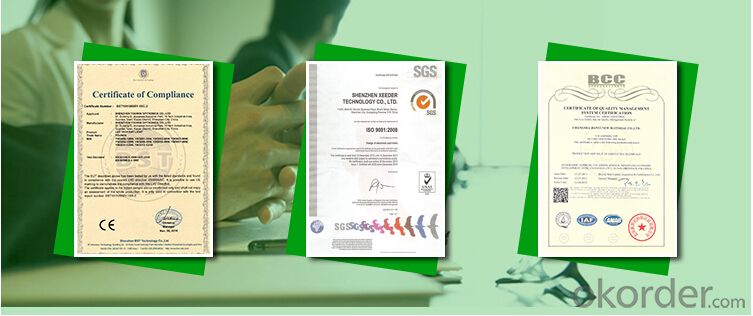
Inquiry Note
How to send an effective inquiry for saving your time?
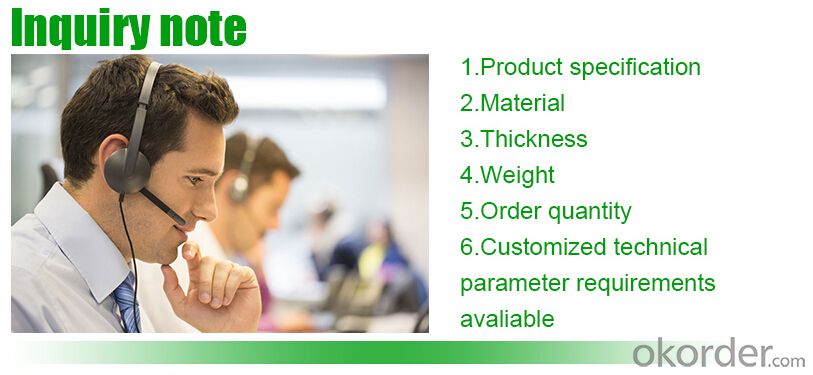

Packaging & Shipping
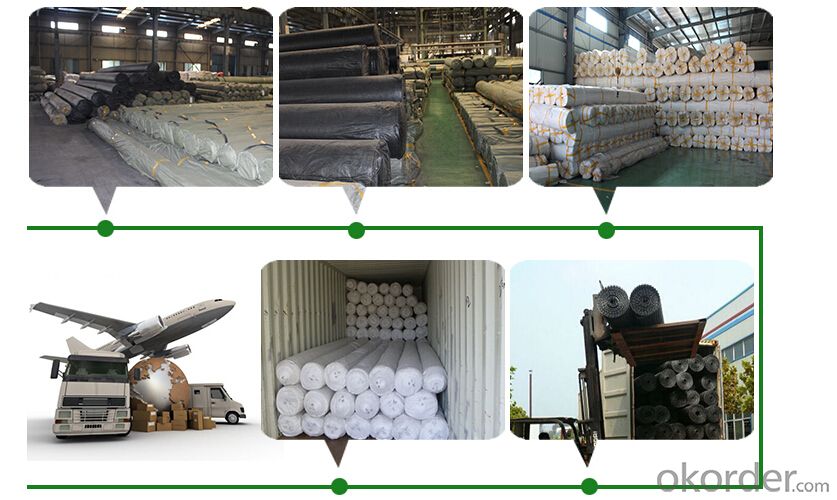
| Packing | Woven bag/PE bag packing or as customer request |
| Shipping | FOB Changsha,customized shipping terms and oppointed port accepted |
Why choose us ?
We have 20 years manufacturer experience
10000-30000 square meter factory size,more than 10 production lines
We will be your best partner,provide high quality products with CE,ISO,SGS
approved in competitive prive,sincerely hope to make a win-win cooperation with you.

FAQ

- Q: Can a waterproofing membrane be used for a hospital basement?
- A hospital basement can indeed benefit from the use of a waterproofing membrane. Waterproofing membranes are widely employed in various construction projects, including hospitals, to safeguard against water infiltration and shield the structure from problems arising from moisture, such as leaks, dampness, and mold growth. Due to its below-ground positioning, the basement of a hospital is particularly vulnerable to water damage, making the utilization of a waterproofing membrane absolutely essential. This membrane acts as a barricade against water seepage, effectively keeping the basement dry and averting potential harm to both the building and its contents. Furthermore, a waterproofing membrane serves to uphold a clean and safe environment in the hospital basement by preventing the growth of mold and other harmful microorganisms that thrive in damp conditions. All in all, it is highly recommended to use a waterproofing membrane in a hospital basement to ensure the structural integrity and safety of the building.
- Q: Can a waterproofing membrane be used for a basement?
- Yes, a waterproofing membrane can be used for a basement. Waterproofing membranes are designed to prevent water infiltration and can effectively protect basements from moisture and potential water damage. They are typically applied to the exterior or interior walls and floors of basements to create a barrier against water seepage. This helps to keep the basement dry and protect against issues such as mold, mildew, and structural damage.
- Q: Can a waterproofing membrane be used for roofing?
- Yes, a waterproofing membrane can be used for roofing. Waterproofing membranes are commonly used in roofing systems to prevent water infiltration and protect the structure from leaks and water damage. They provide a durable and long-lasting solution for ensuring the roof's waterproofing capabilities.
- Q: Can a waterproofing membrane be used on modified bitumen roofs?
- Yes, a waterproofing membrane can be used on modified bitumen roofs. In fact, it is a common practice to install a waterproofing membrane over modified bitumen roofs to provide an additional layer of protection against water infiltration. This is especially important in areas with heavy rainfall or where the roof is prone to frequent exposure to water. The waterproofing membrane helps to seal any potential cracks or gaps in the modified bitumen roofing system, preventing water from seeping through and causing damage to the underlying structure. Additionally, the waterproofing membrane can also enhance the overall durability and longevity of the roof by protecting it from the harmful effects of moisture.
- Q: Does a waterproofing membrane prevent water infiltration through concrete or other building materials?
- Yes, a waterproofing membrane is designed to prevent water infiltration through concrete or other building materials. It acts as a barrier, effectively sealing off the surface and protecting the underlying structure from water damage.
- Q: Can a waterproofing membrane be used in high-rise buildings?
- Yes, a waterproofing membrane can be used in high-rise buildings. It is commonly utilized in high-rise buildings to prevent water infiltration and protect the structure from potential damages caused by moisture. The membrane is applied to various surfaces such as roofs, foundations, and walls to create a barrier against water penetration, ensuring the building remains dry and structurally sound.
- Q: Can a waterproofing membrane be used for military facilities?
- Yes, a waterproofing membrane can be used for military facilities. Waterproofing membranes are commonly used to protect structures from water infiltration and damage, which is crucial in military facilities to ensure the integrity and longevity of the infrastructure. Additionally, waterproofing membranes can also provide additional benefits such as protection against chemical and environmental hazards, making them suitable for military applications.
- Q: Can a waterproofing membrane be used in saunas?
- Yes, a waterproofing membrane can be used in saunas. Saunas are high-moisture environments, and the use of a waterproofing membrane can help prevent water damage and protect the underlying structure from moisture penetration. The membrane acts as a barrier, preventing water from seeping through and causing potential issues such as mold, mildew, and rot. It is important to choose a waterproofing membrane that is specifically designed for high-moisture areas and can withstand the extreme heat and humidity of a sauna. Proper installation and adherence to manufacturer guidelines are also crucial to ensure the effectiveness and longevity of the waterproofing membrane in a sauna setting.
- Q: Are waterproofing membranes suitable for bridge abutments?
- Yes, waterproofing membranes are suitable for bridge abutments. These membranes provide an effective barrier against water infiltration, protecting the abutments from moisture-related damages such as corrosion, deterioration, and leakage. They help extend the lifespan of the bridge and ensure its structural integrity.
- Q: Can a waterproofing membrane be used for green roofs?
- Yes, a waterproofing membrane can indeed be used for green roofs. Waterproofing membranes are commonly used as a crucial layer in green roof construction to prevent water leakage and protect the underlying structure. It provides an effective barrier against water infiltration, ensuring the green roof system remains watertight and preserving the integrity of the building.
Send your message to us
SBS Modified Bitumen Waterproof Membrane
- Loading Port:
- Shanghai
- Payment Terms:
- TT OR LC
- Min Order Qty:
- 1000 m²
- Supply Capability:
- 200000 m²/month
OKorder Service Pledge
OKorder Financial Service
Similar products
Hot products
Hot Searches
Related keywords
